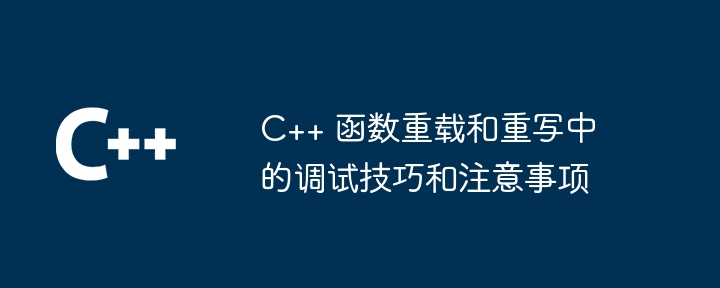Home >Backend Development >C++ >Debugging tips and considerations in C++ function overloading and rewriting
Debugging tips and considerations in C++ function overloading and rewriting
- WBOYWBOYWBOYWBOYWBOYWBOYWBOYWBOYWBOYWBOYWBOYWBOYWBOriginal
- 2024-04-20 15:03:02893browse
For debugging in C function overloading and rewriting, key issues include: Debugging overloading: Use qualifiers to explicitly specify the overloaded function to be called, and use debug output to verify overload correctness. Debug overrides: Verify inheritance, ensure signatures match, add debug output, and disable base class methods using the override keyword to force type checking.

Debugging tips and considerations in C function overloading and rewriting
Key concepts
- Function overloading: Multiple functions in the same scope with the same name but different parameter lists.
- Function overriding: A function with the same signature (name and parameter list) in the subclass, which overrides the function of the same name in the base class.
Debug overloading
- Compiler prompt: The compiler may give an error that overloading is unclear, Indicates that the function to be called cannot be determined.
- Use qualifiers: Use namespace or class name qualifiers to explicitly specify the overloaded function to be called.
- Debug output: Use the output statement to print the name or parameters of the function being called to verify overloading correctness.
Example
// 定义重载函数
double max(int a, int b);
double max(double a, double b);
int main() {
// 调用重载函数
double d1 = max(10, 15);
double d2 = max(12.5, 10.3);
// 使用输出验证重载
std::cout << "d1: " << d1 << std::endl;
std::cout << "d2: " << d2 << std::endl;
return 0;
}Debug override
- Inheritance relationship: Make sure the subclass does inherit the base class, otherwise the override will not work.
- Base class override: Ensure that the subclass method completely overrides the base class method and does not accidentally add any extra parameters.
- Type checking: The compiler should give a warning or error indicating that a call to an overridden method does not match the signature of the base class method.
Practical case
Imagine the following scenario:
- You have a base class
Shape, contains thedraw()method for drawing shapes. - You create a subclass
Circle, inheriting fromShape, and override thedraw()method to draw a circle.
But when Circle::draw() is called, it draws a square (the behavior of the base class Shape)!
Debugging steps:
-
Verify inheritance: Check whether the
Circleclass correctly inherits fromShape. -
Signature matching: Compare the signatures of the
Circle::draw()andShape::draw()methods to make sure they match exactly. -
Add debug output: Add an output statement in the
Circle::draw()method to verify that it is being called.
Fix suggestions:
If the signatures match and the inheritance is correct, then this can be fixed by:
-
Disabling a base class method: Use the
overridekeyword in a subclass method declaration to indicate that it overrides the base class method. This will force type checking at compile time. - Check type derivation: Ensure that the compiler correctly deduces the parameter and return value types of the overridden method.
Note:
- Always ensure that overloaded and overridden functions have clear signatures and clear intent.
- While debugging, carefully examine your code to understand what is going on and add additional debug output as needed.
- Follow good programming practices, including appropriate naming conventions and documentation comments.
The above is the detailed content of Debugging tips and considerations in C++ function overloading and rewriting. For more information, please follow other related articles on the PHP Chinese website!

